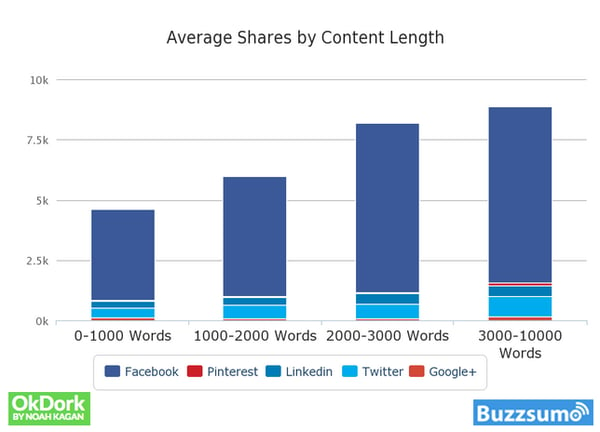In 2018, it seems like everyone wants information in an instant. We walk around with smartphones in our pockets that are capable of answering virtually any question we can think of within seconds. With this in mind, it’s reasonable to assume that a long-form piece of content just wouldn’t cut it in today’s impatient society. But, if you think this way, you’d be wrong. In fact, in recent years, more and more businesses are having their eyes opened to the benefits of long-form content development.
But first, you may be wondering, what exactly is long-form content? While it's difficult to pin down a universal definition, most industry experts agree that long-form content includes blog posts, ebooks and articles containing at least 1,200 words. However, Ramona Sukhraj of IMPACT explains that "numbers are slowly increasing with 3,000 to 10,000 words becoming the new standard."
At first, writing a piece upwards of 2,000 words can seem daunting. But, when you look closely at the benefits of long-form content development, you'll begin to understand why taking this marketing approach can help your business reach new heights.
Long-Form Content Development Moves You Up on the SERP

One of the most important aspects of creating a business blog or another marketing piece is to make sure your audience can read it. If your content doesn't rank on the first page of a Google search, it only reaches 8.5% of searchers. This means that nearly 92% of people won't even know your content exists.
So, how does this tie in to long-form content? According to a serpIQ survey, the average length of a post that ranked in the top 10 search results on Google or other search engines was over 2,000 words. Let that sink in. In a world where short attention spans seem to be the norm, long-form pieces are performing better than short-form pieces on the SERP. Ranking higher on search engines will ultimately result in more traffic to your site and increase the likelihood of user engagement.
In the earlier days of the Internet, searches often left users to choose between page after page of poorly written content. In response, Google's team made changes to their algorithms in an attempt to bring the highest-quality, most comprehensive content to the forefront. Creating long-form pieces will not only help you rank high on the SERP, but it will also help you stand out from competitors who aren’t fully answering their consumers’ questions.
Lastly, in order to rank high for a specific keyword, you'll want to use it multiple times in your piece. However, search engines are intelligent and actually penalize pages for keyword stuffing. Writing a 2,000+-word piece of content is a great way to get your keywords in without overloading your post with the same words and phrases.
Topical SEO Favors Long-Form Content Development
Another benefit of long-form pieces is that they help you dive deep on topics that you want your business to be known for. Topical optimization means that your content writers have covered the topic in depth, offering a detailed piece in response to a specific query.
Simply put, a piece of long-form content makes it easier to cover a topic more thoroughly than a piece of short-form content does. With more space and more words at your disposal, you can fully immerse your audience in your chosen topic, providing context and fleshed-out details to explore the topic from multiple angles. A particularly in-depth topic could even be split into subtopics, allowing you to seamlessly turn a single piece of long-form content into a series of long-form pieces.
As Google and other search engines continue to get smarter and analyze and index information in new ways, generic posts just aren't going to cut it. Fully delving into a topic proves that you can offer enough useful text to truly inform your reader, which will be rewarded by a higher SERP ranking.
Engagement is Boosted with Long-Form Content Development
The more in-depth your post is, the more time a reader will likely spend on your page. If your article just gives bare-bones coverage of a topic, it will likely result in your audience clicking the back button on their browser as quickly as possible. Considering that search engine algorithms can penalize for bounce rates, it's important that your readers don't see a too-short, half-hearted article when landing on your site.
Naturally, longer pieces of content take longer to read, and, while it’s highly unlikely that every visitor will read your entire blog post or article, the more time that is spent scrolling through your page, the more likely it is that your reader will engage with you. Think about it. Wouldn't you be more likely to see a comment like "Great insights!" on a 2,000-word article than on a 200-word blurb? Even small interactions like this are important because they can help spread the word about your business and lead to a relationship between you and the reader.

The above chart from OkDork’s Noah Kagan shows that when looking at the top 10% of the most shared articles, long-form content actually gets shared on Facebook, Twitter, LinkedIn and other popular social media sites more than its short-form counterparts. The more shares you get, the more new readers you’ll get.
Expert Writers Establish Brand Authority with Long-Form Content
Aside from generating more traffic to your site, long-form pieces allow content writers to give the reader everything they need to know about a specific topic. This helps you build trust with your audience, which in turn, makes you stand out as an expert in your field. By providing more information, your audience will begin to value your content and begin seeking you out as an industry authority whenever they have questions or want to learn more about areas of your field.
Longer articles also enable you to take your reader through your topic bit by bit. Rather than offering basic information or squeezing a lot of detailed information into a short piece, using long-form content helps you examine your topic with smooth transitions, guiding your audience through each aspect of the topic being discussed. Breaking text up with pictures and headers not only looks more attractive on the screen, but it also makes navigating the post simple, allowing readers to scroll to a specific section they wish to learn more about.
Lastly, choosing to create long-form content in an ebook format allows you to explore subtopics as chapters, creating a highly structured, high-value resource. Purchasing or downloading an ebook means your reader can keep the information for later viewing without having to research or bookmark a Web address. Having a downloadable ebook available to your readers is a great way to show that you know all there is to know about a hot topic in your industry.
Bring Long-Form Content Development to Your Business
Writing long-form content is more important (and effective) than you may have originally thought. Even in today's fast-paced market, consumers are still willing to spend time doing research to get the products and services they need and want from companies they trust.
However, not everyone has the capability to write and publish comprehensive blog posts, articles and ebooks. Only expert writers know how to manage a large amount of information while keeping an audience engaged. Considering the fact that Google and other search engines are consistently updating the way that they view and rank pages, it can be exceedingly difficult to ensure your posts reach your readers.
If you’re struggling with long-form content development, check out Virtucom Group's blogging packages to find an option that best fits your business and your budget.






